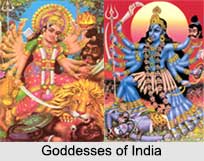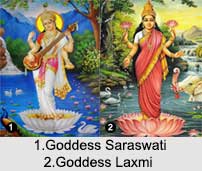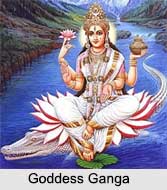 Goddesses of India are huge in number and are worshipped in all parts of India among the Hindu people. Goddess in India is the female deities who have gained prominence and are widely worshipped with great splendour and piety. The Hindu Goddesses have got place in the ancient Hindu scriptures like Bhagavad Gita, Ramayana and Rig Veda. Some of the noted Goddesses of India are discussed below:
Goddesses of India are huge in number and are worshipped in all parts of India among the Hindu people. Goddess in India is the female deities who have gained prominence and are widely worshipped with great splendour and piety. The Hindu Goddesses have got place in the ancient Hindu scriptures like Bhagavad Gita, Ramayana and Rig Veda. Some of the noted Goddesses of India are discussed below:
Goddess Durga
Goddess Durga is a form of Devi, the supreme goddess, having ten arms and each arm has a separate weapon and seated on a lion or a tiger. Durga is the manifestation of the power that helps in preserving the moral order and virtue in the creation. She is like the mother who protects her child or mankind, by destroying the evil forces of selfishness, anger, ego and creating a peaceful environment for her child to live in. She is also known as Parvati, Ambika and Kali. She saved the Devas from the hands of Mahishasura, the Demon. Durga is also known as "Ambey Mata" in the northern parts of India. Navratri is celebrated all over the country celebrating her valour and prowess that helped Lord Rama to release his bride from his captivity.
Goddess Kali
 Another important Goddess of Hindus is the Goddess Kali who is the divine mother seen in a more violent form. She sent her "Shakti" to bestow peace to the Gods after freeing them from demons called Shumbha and Nishumbha. Kali is the first of the Ten Mahavidyas, acquiring the name "Adya" - the goddess, or the first born. Kali is also the Kundalini energy that frees one from the fear of death.
Another important Goddess of Hindus is the Goddess Kali who is the divine mother seen in a more violent form. She sent her "Shakti" to bestow peace to the Gods after freeing them from demons called Shumbha and Nishumbha. Kali is the first of the Ten Mahavidyas, acquiring the name "Adya" - the goddess, or the first born. Kali is also the Kundalini energy that frees one from the fear of death.
Goddess Saraswati
Goddess Saraswati is the goddess of knowledge, music and all other creative forms. She is the goddess of speech, repository of Lord Brahma"s creative intelligence and Mother of the Vedas. Saraswati"s "vahana" is the Swan, which is noted for its extraordinary capabilities for separating water out of milk, symbolizing the power to differentiate between the good and the bad.
Goddess Laxmi
Goddess Laxmi, the deity of wealth and prosperity is worshipped in all parts of India. She is one of the extremely important Goddesses of India in Hindu religion. She is Lord Vishnu"s consort, and they jointly fulfil the acts of perseverance and maintenance. Lakshmi took various forms and accompanied Vishnu in his avatars or incarnations. She is seen seated on a lotus, often seen holding the "amrita kalasham" or the pot of ambrosia and bilva fruit.
Goddess Bhuvaneshwari
Goddess Bhuvaneshwari is the primary force, which demonstrates her as the phenomenal world. She dwells in the "heart chakra" and being a queen she looks for the welfare of her subjects. She is one of the ten Mahavidyas, who represent some divine incarnation or representation of the Divine Mother. Worship of Goddess Bhuvaneshwari brings change in the emotions as well as in body chemistry.
 Goddess Aditi
Goddess Aditi
Goddess Aditi is regarded as the mother of the Gods from whose cosmic matrix the heavenly bodies were born. She is the unbounded Sky Goddess, honoured as the mother creator of life because she gave birth to the planets and the stars. It is believed that before the creation, the universe was inside the womb of Goddess Aditi.
Goddess Parvati
Goddess Parvati is the most widely worshipped Goddess in India who is the manifestation of Shakti and is the Female Creative Energy of the Universe. She forms a part of Lord Shiva for which He is called "Ardhanaarishwar". She is the Kali in her unmarried state. She is described as beautiful and magnificent in her disposition.
The Goddesses of India are numerous and have a great importance in the religious life. They are center of all Shaktis and seem to be enhancing the power of the Indian Gods. The Hindu Goddesses are not only worshipped in temples but annually worshipped in Mandapas which has become a major attraction for all. The religious festivals have become a part of the regular celebrations of the people as a means of relief from a mundane life. The Goddesses are worshipped with great devotion and reverence as they are said to be the creators of the world, the conferrers of health, wealth and prosperity to the human beings.









